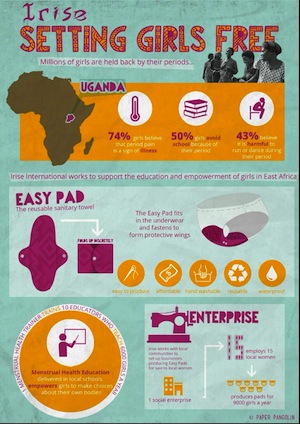
Berlin. – Diarrheal disease is the second leading cause of death in children under five years old. According to the World Health Organization it is both preventable and treatable. The Berlin-based NGO WASH UNITED is working on prevention, using games, fun and sport. “The aim is not just having toilets, but toilet use”, explained Danielle Keiser from WASH UNITED on Tuesday evening at the event-series “Sustainability Drinks”.
The NGO is working on creating demand for toilets through behavioral change and raising awareness. Access to water and sanitation is a human right. People should be able to claim this right and demand installment of sanitary facilities. But in order to prevent failed interventions such as unused toilets in India, education on why sanitation and hygiene is relevant is crucial. This is why WASH UNITED does not provide toilets or water pumps (the hardware) but focuses on education and behavioral change (software).

The main attention is given to children, as it is easier to change their attitudes. Games and sport is used to bring the message across in the programs in Kenya and India. In order to explain germ spreading and why the use of soap is important the children play with a chalk-covered ball.
A rather new aspect of WASH (Water, Sanitation and Hygiene) is Menstrual Health Management (MHM).
The Menstrual Hygiene Day was realized in 2014 for the first time. "In the beginning we had 30 partners working on MHM, by now we have more than 200", said Keiser. Taboos, such as the perception that menstruation is dirty and false information are restricting girls in their everyday lives and have a negative impact on their self-esteem. One of the Organizations working on MHM exclusively is the British NGO Irise International. According to Irise there is still a lack of research about the impact of education and availability of a sanitary product on girls´ self esteem and e.g. attendance in schools. Therefore Irise is currently realizing a research project in Uganda. Part of the project is to deliver Menstrual Health Education (MHE) in schools. Additionally Irise is providing reusable pads.
Similarly to WASH UNITED, Irise uses education as a tool for change and to challenge taboos. It is not about charity and distributing products, but about raising awareness and enabling people to decide for themselves if they would reallocate resources to buy sanitary products, because they think it is important.
According to Niki Fitzgerald, MHE-Coordinator at Irise: "The most difficult thing to address when discussing menstrual health is not any of the biology, the girls and educators are very keen and quick to learn the science, it is the gender aspects that are raised during our discussions. Ideas such as women being more than just baby producing machines or having the right to enjoy sex." The Irise framework encourages discussion, in which participants come up with their own answers with minimal direction from the facilitator. "Hearing them discuss those topics and trying to phrase questions to help them think about things in a different way is a big challenge."
The Irise curriculum for MHE can be found here. (The resource is continuously adapted. An updated version will be provided soon.)
Sources: wash-united.org | irise.org.uk
Photos: © WASH UNITED – Toilet World Cup, “germ ball”
Infographic: © Irise International



